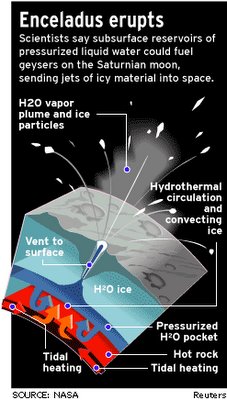Ice geysers have been discovered on a tiny ice moon orbiting Saturn. Enceladus southern pole is not only warmer than expected, but the geysers are revealing hints of organice material beneath its icy surface.
(MSNBC) The readings from Enceladus' geyser plumes indicate that all the prerequisites for life as we know it could exist beneath Enceladus' surface, Porco said.
"Living organisms require liquid water and organic materials, and we know we have both on Enceladus now," she said. "The plumes through which Cassini flew last July contain methane, contain CO2, propane — they contain several organic materials."
An explanation is still needed to explain why Enceladus's southern hemisphere is warmer than expected. Some scientists suspect a molten core off center could be a factor, as the moon is too small to be thawed by tidal friction or sunlight.

(MSNBC) Although the surface temperatures were far below freezing, the readings showed relatively warm spots in the south polar region, centering on the tiger stripes. Scientists traced the internal heating patterns that could create such warm spots, and concluded that temperatures could be above freezing mere yards beneath the surface.
"It can be warm enough 10 meters or so beneath the surface," Porco explained, "and there's enough pressure to keep liquid water stable at that depth."
Scientists are adding Enceladus as one of the possible worlds that harbor life within our solar system along with Europa. Both worlds are similiar in nature, and exploring the make-up of one of these worlds may help us understand the design of the other.






![ColonyWorlds[at]Gmail[dot]com](http://img.photobucket.com/albums/v438/hiddennook/ColonyWorlds.png)






